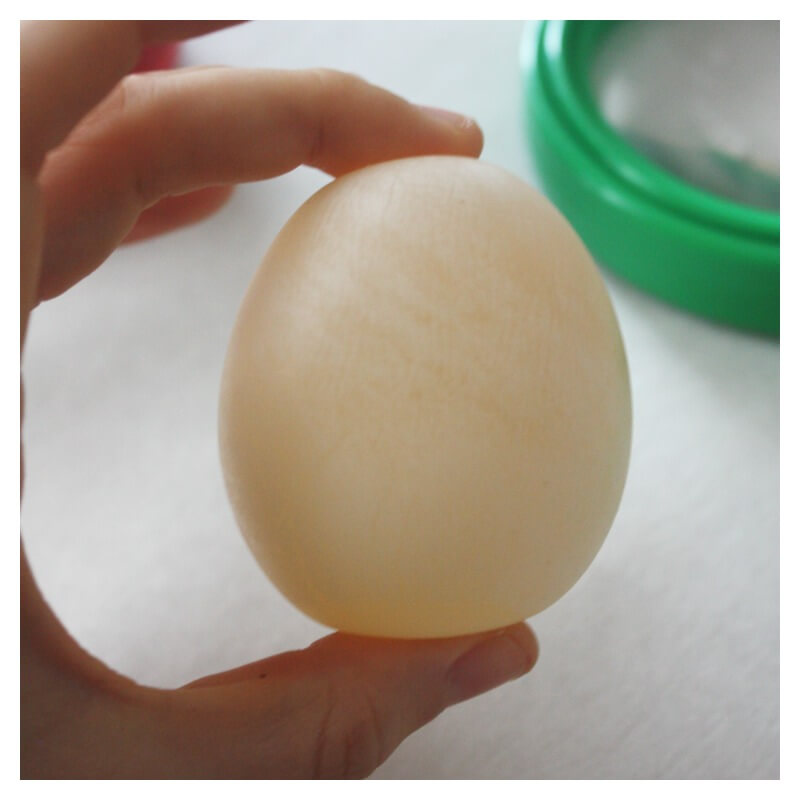
The calcium carbonate will become carbon dioxide gas which will go into the air. The acetic acid reacts with the calcium carbonate in the egg shell and releases carbon dioxide gas that you see as.

What is left is the soft tissue that lined the inside of the eggshell.
What happens when you put an egg in vinegar. Be careful the eggshell will be a lot weaker. If you leave the egg in the vinegar for about 36 hours eventually all the calcium carbonate will be dissolved by the acetic acid leaving just the soft membrane and yolk behind. Do you think an egg would be able to hatch if.
What happens when you put an egg in vinegar for 24 hours. If you soak an egg in vinegar the eggshell will absorb the acid and break down or dissolve. The calcium carbonate will become carbon dioxide gas which will go into the air.
Soak one egg in vinegar for 24 hours 1 day one egg for 48 hours 2 days and one egg for 72 hours 3 days. The egg in vinegar experiment though pretty simple gives your child the foundation knowledge on reactions between acids and bases. It goes on to change the chemical composition of an egg making it rubbery on being dipped in vinegar for a few days.
Vinegar is an acid. If you soak an egg in vinegar the eggshell will absorb the acid and break down or dissolve. The calcium carbonate will become carbon dioxide gas which will go into the air.
How long do you leave an egg in vinegar to make it bounce. If you soak this egg shell in vinegar which is about 4 acetic acid you start a chemical reaction that dissolves the calcium carbonate shell. The acetic acid reacts with the calcium carbonate in the egg shell and releases carbon dioxide gas that you see as.
Soaking an egg in vinegar produces what is known as a naked egg which is an egg without a shell. The vinegar dissolves the shell but leaves the membrane that holds the egg intact. What happens when you leave an egg in vinegar.
If you soak an egg in vinegar the eggshell will absorb the acid and break down or dissolve. The calcium carbonate will become carbon dioxide gas which will go into the air. What is left is the soft tissue that lined the inside of the eggshell.
If you soak this egg shell in vinegar which is about 4 acetic acid you start a chemical reaction that dissolves the calcium carbonate shell. The acetic acid reacts with the calcium carbonate in the egg shell and releases carbon dioxide gas that you see as bubbles on the shell. What happens when you put an egg in vinegar for 2 days.
If you soak an egg in vinegar the eggshell will absorb the acid and break down or dissolve. The calcium carbonate will become carbon dioxide gas which will go into the air. Soak one egg in vinegar for 24 hours 1 day one egg for 48 hours 2 days and one egg for 72 hours 3 days.
What happens if you put an egg in vinegar for 24 hours. If you soak an egg in vinegar the eggshell will absorb the acid and break down or dissolve. The calcium carbonate will become carbon dioxide gas which will go into the air.
Soak one egg in vinegar for 24 hours 1 day one egg for 48 hours 2 days and one egg for 72 hours 3 days. If you soak this egg shell in vinegar which is about 4 acetic acid you start a chemical reaction that dissolves the calcium carbonate shell. The acetic acid reacts with the calcium carbonate in the egg shell and releases carbon dioxide gas that you see as bubbles on the shell.
WHAT HAPPENS WHEN YOU PUT AN EGG IN VINEGAR. The eggshell gets its hardness from a mineral called calcium carbonate similar to our bones. When you place the egg into the vinegar you will start to observe bubbles.
These bubbles are a chemical reaction between the acid in the vinegar and the base in the calcium carbonate of the eggshell. If we soak an egg in vinegar we will start an acid-base reaction. The acetic acid from vinegar reacts with calcium carbonate base from an eggshell.
Products of that reaction are calcium acetate water and carbon dioxide. You can notice bubbles forming on the eggshell surface thats the. What happens when you put eggs in different liquids.
Orange juice and vinegar both contain acids which react with the calcium carbonate in the eggs to produce carbon dioxide gas. This is why the eggs fizz in those liquids. Over time this reaction has the effect of.